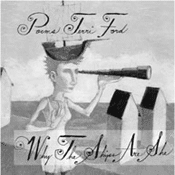interview 1
Interview with Terri Ford (Story Problem)

 Bio : Terri Ford is a writer and poet, graduate of the M.F.A. Program for Writers at Warren Wilson College in Swannanoa, North Carolina. She is a recipient of grants from the Ohio Arts Council and the Kentucky Arts Council, as well as the Kentucky Foundation for Women. She was the Ohio Arts Council Writing Fellow at the Fine Arts Work Center in Provincetown, Massachusettes in the summer of 1999.
Bio : Terri Ford is a writer and poet, graduate of the M.F.A. Program for Writers at Warren Wilson College in Swannanoa, North Carolina. She is a recipient of grants from the Ohio Arts Council and the Kentucky Arts Council, as well as the Kentucky Foundation for Women. She was the Ohio Arts Council Writing Fellow at the Fine Arts Work Center in Provincetown, Massachusettes in the summer of 1999.
Terri Ford performs her poems at venues around the country. She performed as the "First Voice" in Stage First's production of Dylan Thomas's Under Milk Wood in Cincinnati in 1997. Currently, she is collaborating with Uncle Glockenspiel, who makes a lot of noise to accompany her poems. For six years, Terri ran a poetry reading series in the greater Cincinnati area.

Carlo Zanni - In your webwork Story Problem, the user is asked to determine the loading process through his mouse movements. I see here a parallel with actors, when they interpret a text written by others. Is there a similarity? I mean, do you think of users as "physical" compilers or interpreters of your code?
Terri Ford - I think Erik did a sort of interpretation of the text as well as a terrific enhancement of it - and I love the feature he created that opens up the piece to multiple experiences of it. That is, to me, what happens when anyone reads a poem or views a piece of visual art anyway - their own layers of perception and levels/breadth of human experience will determine to some extent what they are comprehending anyway. Sometimes the "audience" (i.e., reader/viewer) is directed very clearly to read the "text"(art) - I am thinking specifically of a piece of visual art I once saw in an exhibition which had text in it that clearly manipulated/directed the experience in a way that I found extremely insulting! What Erik did was generous and open-ended and full of a variety that I love. To me, great art contains surprises - and this does.
C.Z. - Was the Story Problem text written with the aim to be loaded by users, or is it something you "transcoded" for this occasion? If this is so, do you see any structural difference between writing for paper (or "classic" screen) and these alternative uses?
T.F. - I have no earthly idea what you mean by transcoded! The wonderful Jennifer Grotz, poetry editor of Born Magazine, asked whether I'd be interested in sending in some poems, and among what I sent in, she chose "Story Problem". It therefore definitely wasn't written toward the idea of collaboration. As I understand the process, Erik was given Story Problem as the text to do his wild thing (or perhaps he had a choice and chose Story Problem? he would have to clarify this for you)… We had a wonderful phone conversation about our ideas, and he said at one point he hesitated to ask for literal clarification - that he might like to keep his own idea of what "giddyfoot" means rather than knowing what I had in mind! That in itself seems very emblematic of the way the entire piece is structured … the openness/flexibility of it.
Truthfully, I know poets wrote for occasions in the past - presidential appearances, anniversaries, etc. I have been "commissioned" to write in that way, but I don't consider those commissioned poems to be among my best. I believe the best ideas for poems come from inside, not from outside. But another poet may work very happily with a certain intent like this in mind.
C.Z. - Also, why do you feel that your text needs the interaction with the users, and the Web experience? Do you see it as gaining something more, some new or hidden meanings perhaps, that maybe ink & paper cannot bring you? In other words, why does ink loose and screen win (in this case)?
T.F. - Gee, you seem to be implying that the poem is not a poem by itself! I believe the poem benefited from the Web experience and could be seen/perceived in lovely new ways and perhaps reached others it might not have otherwise because of it. It doesn't seem for me to say whether or not the poem brings out new or hidden meanings - you would have to ask the people who'd read it. Since I am a poet and I have an imagination, it is hard for me to ever conceive of ink and paper not being "enough" in some way. Erik also has a terrific imagination that seems geared in several different directions that mine isn't - and I believe and hope we added to one another, rather than desperate necessity to shore up two not-enough-in-themselves projects!
C.Z. - How important is user's feedback in your net practice? do you feel that people interaction adds a "value" to your work?
T.F. - People interaction is absolutely necessary! If one is going to connect with the world - and be understood, which is something everyone wants - it's essential.
C.Z. - Can you please tell me about your narrative works?
 T.F. - I have a book of poems out from Four Way Books (2000) entitled WHY THE SHIPS ARE SHE. I usually understand "narrative" poems to be poems that tell a story … and I don't believe my poems are primarily narrative. They may include some of the same elements as a story, but I think primarily my poems are lyrical - which I understand to be a sort of crying out, an impulse to sing - that is, a form which has more in common with song than storytelling.
T.F. - I have a book of poems out from Four Way Books (2000) entitled WHY THE SHIPS ARE SHE. I usually understand "narrative" poems to be poems that tell a story … and I don't believe my poems are primarily narrative. They may include some of the same elements as a story, but I think primarily my poems are lyrical - which I understand to be a sort of crying out, an impulse to sing - that is, a form which has more in common with song than storytelling.
I have written since I was a kid and have written poetry seriously for about 25 years. I couldn't imagine living without poetry, and when I perform, that's when I know why I was born. I'll never stop reciting my poems alone, but I'm always interested in doing something new. Because I am very much seduced by sound and my poems seem to be rather noisy, musical collaborations have always seemed natural.
I have often performed with a good friend of mine, Christian Schmit (also a talented visual artist who did the cover of my book), who functions as a sort of one-man band who makes noise/music in conjunction with my poems. We've talked about doing videos, as there is a visual aspect to our performance that CDs just wouldn't capture (for instance, we used to throw out giant underpants with lines of my poetry pinned into the label during a poem titled Panty Raid; for another instance, we both dress like maniacal superheroes). So working with Eric was not a foreign idea to me and was an enterprise I looked forward to eagerly - because I know what I bring to the collaboration, but I don't know what the other person is bringing, and I don't know what the third thing is going to be that we produce in tandem - and I love that surprise and anticipation of not knowing.
I have also collaborated before when it hasn't worked, and in those instances, I think the failure was in not making a third thing - in staying so separate that no fusion took place, for whatever reason.
And another wonderful surprise of collaboration is simply having company! By the time I began collaborating in earnest, I had already performed around a lot by myself, and was accustomed to making all the decisions of how/when/what/in what order alone. I have been amazed at the chemical mix; simply by trusting my collaborator I've seen all sorts of disorder work splendidly, blossoming into something I didn't exactly dream up myself but am proud to be part of. I feel the same mystified, delighted not-quite-mine credit in looking at Story Problem. Believe me, I am Erik's fan!
By the way, for more information than you ever dreamed of wanting & a few funny stories, please feel free to check out this on-line interview from Drought literary magazine.
Interview by Carlo Zanni

Read the interview with the co-author of Story Problem, Erik Loyer, by Carlo Zanni, in this issue.
Read the commentary of Story Problem by Anne-Marie Boisvert & Carlo Zanni in this issue.

 top top
 back back
|

